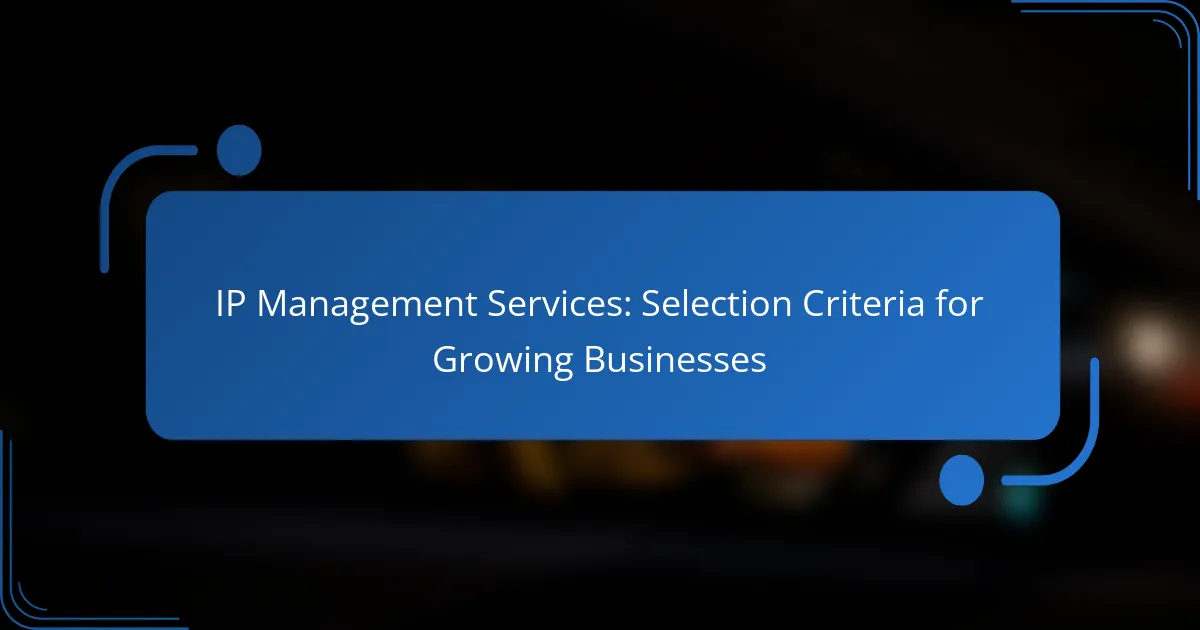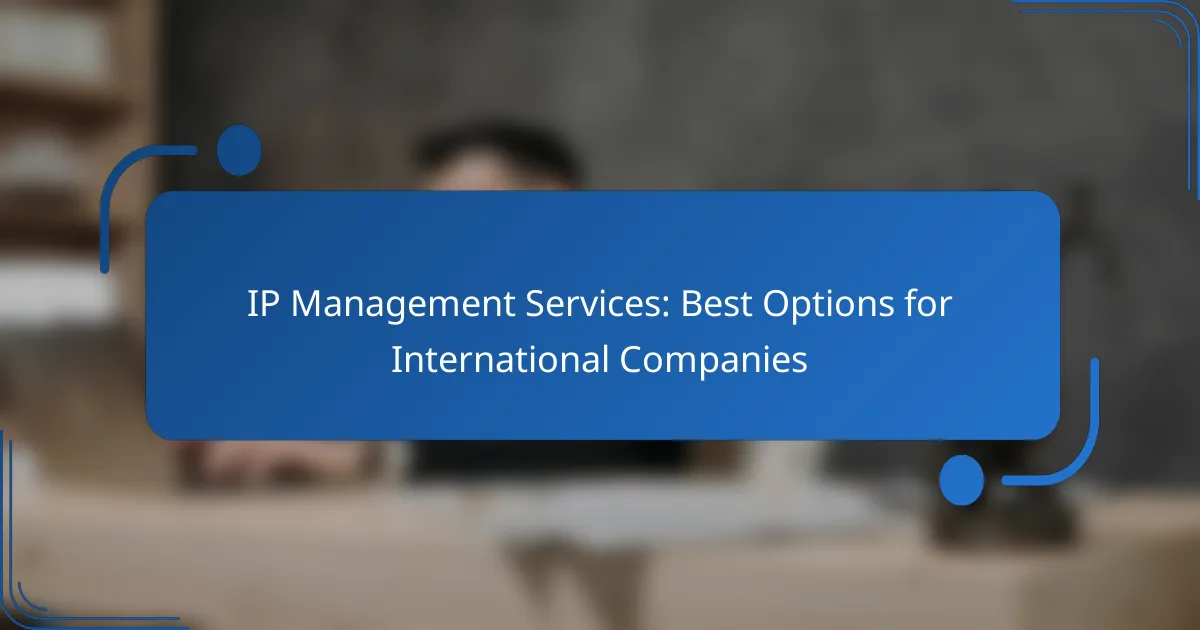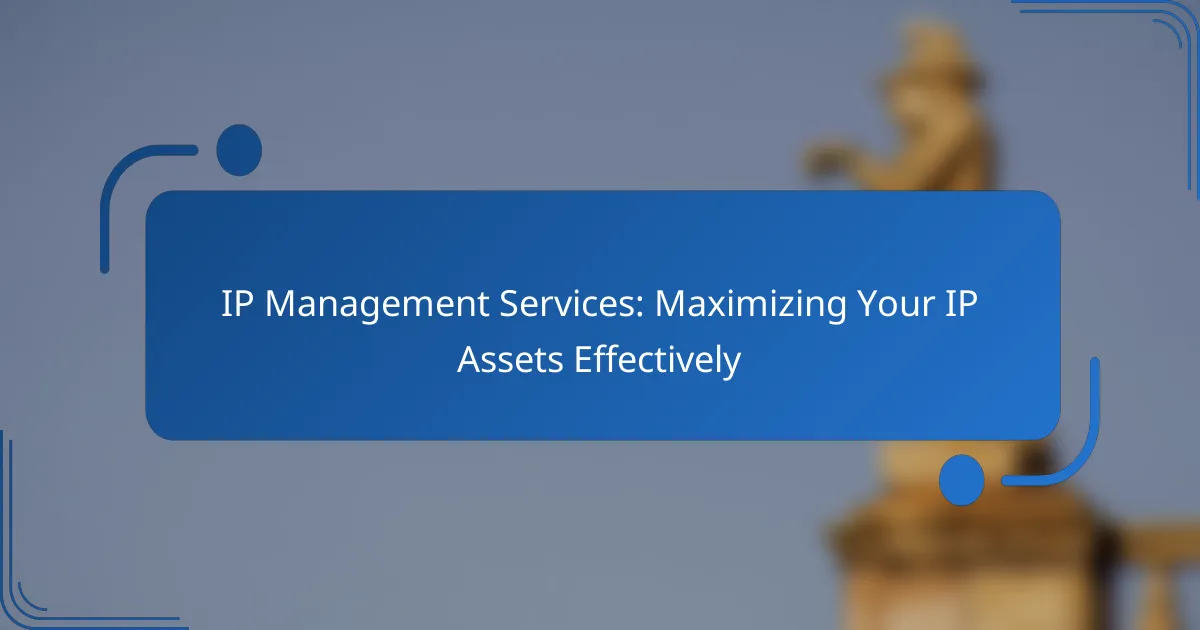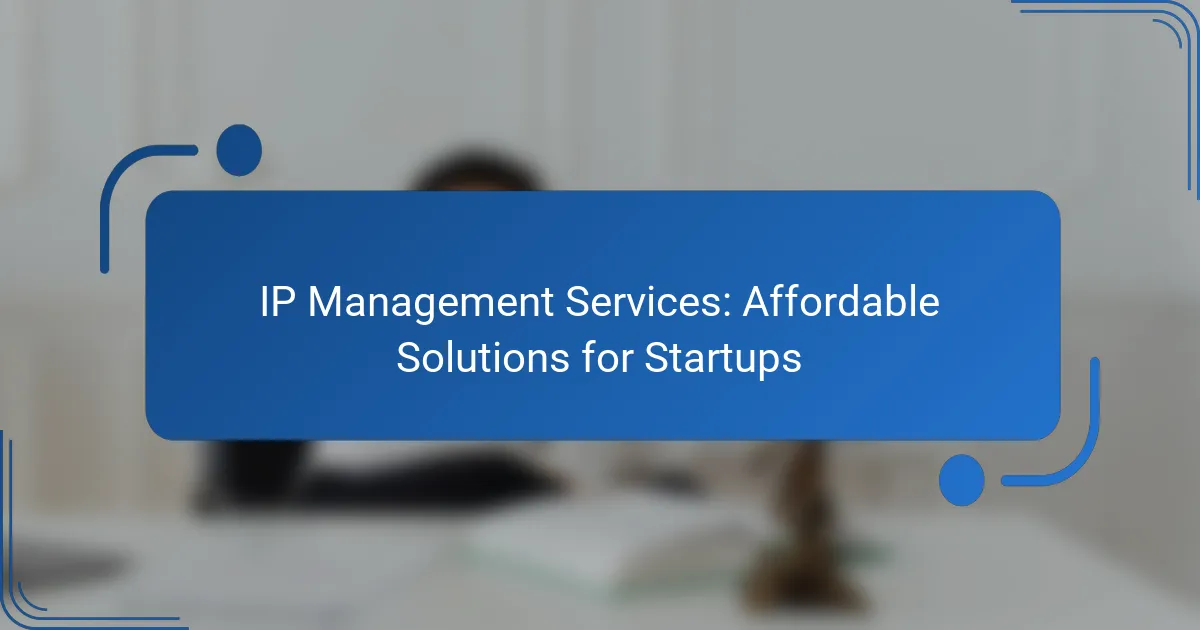For growing businesses, effective IP management services are essential to safeguard intellectual property and maintain a competitive advantage. When selecting a provider, it’s important to consider their service offerings, industry expertise, pricing structures, and client feedback to ensure comprehensive protection and support for your IP assets.

What Are the Key IP Management Services for Growing Businesses?
Growing businesses need effective IP management services to protect their intellectual property and enhance their competitive edge. Key services include managing IP portfolios, registering trademarks, filing patents, valuing IP assets, and providing litigation support.
IP portfolio management
IP portfolio management involves organizing and overseeing a company’s intellectual property assets to maximize their value. This includes tracking registrations, renewals, and potential infringements, ensuring that all assets are properly maintained and utilized.
Businesses should regularly review their IP portfolio to identify underperforming assets and make strategic decisions about which to retain, license, or sell. Utilizing software tools can streamline this process and provide insights into asset performance.
Trademark registration services
Trademark registration services help businesses secure their brand identity by registering trademarks with the appropriate authorities. This process typically involves conducting a trademark search to ensure the desired mark is available and filing the necessary applications.
It’s crucial to consider the jurisdictions where the trademark will be used, as registration can vary significantly across regions. For example, in the United States, the application process can take several months, while in the European Union, it may take longer due to additional checks.
Patent filing assistance
Patent filing assistance guides businesses through the complex process of securing patents for their inventions. This service includes preparing patent applications, conducting prior art searches, and ensuring compliance with patent office requirements.
Filing a patent can be costly, often ranging from a few thousand to tens of thousands of dollars, depending on the complexity of the invention and the number of jurisdictions involved. Engaging a qualified patent attorney can help navigate these challenges effectively.
IP valuation services
IP valuation services assess the monetary value of a company’s intellectual property assets. This is essential for various business activities, including mergers, acquisitions, and securing financing.
Valuation methods can vary, including cost, market, and income approaches. Understanding the value of IP can help businesses make informed decisions about investments and strategies to enhance their asset portfolio.
IP litigation support
IP litigation support provides assistance during legal disputes involving intellectual property rights. This service includes preparing legal documents, conducting research, and offering expert testimony when necessary.
Businesses should be aware that IP litigation can be expensive and time-consuming, often requiring significant resources. Early intervention and effective legal strategies can help mitigate risks and protect valuable assets.

How to Choose the Right IP Management Service?
Selecting the right IP management service is crucial for growing businesses to protect their intellectual property effectively. Focus on service offerings, industry expertise, pricing structures, and client feedback to make an informed decision.
Assess service offerings
When evaluating IP management services, consider the range of offerings available. Look for services that cover patent, trademark, and copyright management, as well as licensing and enforcement support.
Ensure the service can handle your specific needs, such as international filings or compliance with local regulations. A comprehensive service will streamline your IP processes and reduce the risk of oversight.
Evaluate industry expertise
Industry expertise is essential in choosing an IP management service. A provider with experience in your sector will better understand the unique challenges and opportunities you face.
Check for certifications, past projects, and case studies that demonstrate their proficiency. A knowledgeable service can offer tailored strategies that align with your business goals.
Consider pricing structures
Pricing structures can vary significantly among IP management services. Some may offer flat fees, while others charge hourly rates or a combination of both.
Compare costs against the services provided to ensure you receive value for your investment. Be cautious of hidden fees that could inflate your overall expenses.
Check client testimonials
Client testimonials provide insight into the reliability and effectiveness of an IP management service. Look for reviews that highlight the provider’s responsiveness, expertise, and overall satisfaction.
Consider reaching out to current or past clients for direct feedback. This can help you gauge how well the service meets the needs of businesses similar to yours.

What Are the Benefits of IP Management Services?
IP management services offer significant advantages for businesses, including enhanced protection of intellectual property, improved compliance with regulations, and streamlined innovation processes. These services help organizations safeguard their assets while fostering a competitive edge in the market.
Enhanced protection of intellectual property
Effective IP management services provide robust mechanisms to protect intellectual property from infringement and unauthorized use. This includes registering patents, trademarks, and copyrights, which can deter potential violators and strengthen legal claims.
Businesses should regularly monitor their IP assets and enforce their rights through legal channels when necessary. Utilizing technology for tracking and managing IP portfolios can also enhance protection efforts, ensuring that businesses stay informed about potential threats.
Increased market competitiveness
By leveraging IP management services, businesses can enhance their market position through exclusive rights to their innovations and branding. This exclusivity allows companies to differentiate themselves from competitors, potentially leading to increased market share.
Furthermore, a strong IP portfolio can attract investors and partners, as it signifies a commitment to innovation and quality. Companies with well-managed IP are often viewed as more credible and trustworthy in their respective industries.
Improved compliance with regulations
IP management services help businesses navigate the complex landscape of intellectual property laws and regulations. By ensuring compliance with local and international standards, companies can avoid costly legal disputes and penalties.
Staying updated on changes in IP legislation is crucial. Businesses should consider regular audits of their IP practices to ensure they align with current regulations, particularly in regions with stringent IP laws.
Streamlined innovation processes
IP management services facilitate more efficient innovation by providing a structured approach to managing ideas and inventions. This includes assessing the patentability of new concepts and ensuring that resources are allocated effectively to develop viable products.
Implementing a clear IP strategy can help teams prioritize projects based on potential market impact and alignment with business goals. Regularly reviewing and updating this strategy is essential to adapt to changing market conditions and technological advancements.

What Criteria Should You Use to Evaluate IP Management Services?
When evaluating IP management services, consider factors such as scalability, technological capabilities, and customer support quality. These criteria will help ensure that the service can meet your business’s evolving needs and provide effective support throughout your IP lifecycle.
Service scalability
Service scalability refers to the ability of an IP management service to grow and adapt alongside your business. As your company expands, your IP needs may change, requiring a service that can accommodate increased volumes or more complex requirements.
Look for providers that offer flexible plans or tiered pricing structures, allowing you to upgrade as needed without incurring excessive costs. For instance, a service that charges based on the number of IP assets managed can be advantageous for growing businesses.
Technological capabilities
Technological capabilities encompass the tools and features offered by an IP management service. A robust platform should provide functionalities such as automated filings, real-time tracking, and data analytics to streamline your IP processes.
Evaluate whether the service integrates with other software you use, such as project management or legal tools. This integration can enhance efficiency and reduce the risk of errors. Additionally, ensure that the platform is user-friendly, as this will facilitate adoption by your team.
Customer support quality
Customer support quality is crucial for resolving issues promptly and effectively. A responsive support team can significantly impact your experience with an IP management service, especially during critical times like filing deadlines or disputes.
Assess the availability of support channels, such as phone, email, or live chat, and consider the service’s response times. A provider that offers 24/7 support may be particularly beneficial if your business operates across different time zones.

What Are the Common Challenges in IP Management?
Growing businesses often face several challenges in intellectual property (IP) management, including navigating complex laws, managing costs, and keeping pace with rapid technological advancements. Addressing these issues is crucial for protecting valuable assets and ensuring compliance.
Complexity of international laws
The complexity of international laws can create significant hurdles for businesses managing their IP. Different countries have varying regulations, treaties, and enforcement mechanisms, making it essential to understand local laws and international agreements.
For example, the Paris Convention and the TRIPS Agreement set certain standards, but local interpretations can differ. Businesses should consider consulting with legal experts familiar with the jurisdictions they operate in to avoid costly missteps.
Cost management issues
Cost management is a critical aspect of IP management, as expenses can quickly accumulate. Filing fees, maintenance costs, and legal expenses can strain budgets, particularly for startups and small businesses.
To manage these costs effectively, companies should prioritize their IP portfolio, focusing on the most valuable assets. Utilizing online tools for monitoring and filing can also help reduce expenses while ensuring compliance.
Keeping up with technology changes
The rapid pace of technological change poses challenges for IP management, as new innovations can render existing protections obsolete. Businesses must stay informed about emerging technologies and adapt their IP strategies accordingly.
Regularly reviewing and updating IP portfolios is essential. Companies should consider investing in training for their teams to understand new technologies and their implications for existing IP rights, ensuring they remain competitive in the market.



